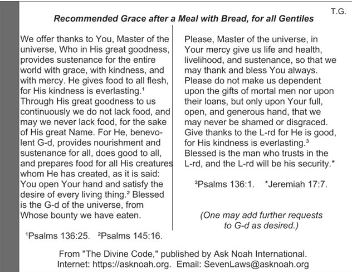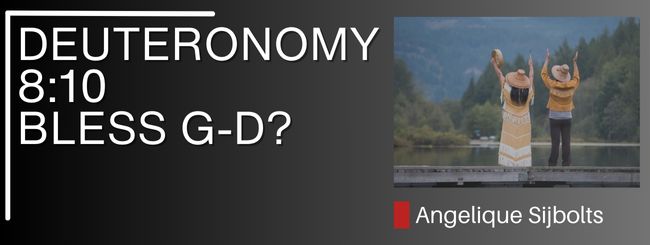10 Sivan 5783 – 30 May 2023
What is a blessing, bracha, in Hebrew? The first thing we often think of is the blessing that G-d gives to us humans. Sometimes we think, for example, that we ourselves take care of our bread, clothing, shelter, etc. But it is G-d blessing us with that. As long as we are healthy, we are not always aware of this. But the fact that our bodies function as they should is a blessing. Family, friends, everything is a blessing, everything comes from His hands. We see this, for example, in Deuteronomy 2;7. In the desert, the people had nothing, they depended on G-d for everything. However, they lacked nothing. They had protection, no trouble from the heat, no trouble from the cold, no worn-out clothes and enough to eat and drink.
כִּי֩ ה’ אֱ-לֹקיךָ בֵּֽרַכְךָ֗ בְּכֹל֙ מַעֲשֵׂ֣ה יָדֶ֔ךָ יָדַ֣ע לֶכְתְּךָ֔ אֶת־הַמִּדְבָּ֥ר הַגָּדֹ֖ל הַזֶּ֑ה זֶ֣ה ׀ אַרְבָּעִ֣ים שָׁנָ֗ה ה’ אֱ-לֹקיךָ֙ עִמָּ֔ךְ לֹ֥א חָסַ֖רְתָּ דָּבָֽר׃
Indeed, your G-d Hashem has blessed you in all your undertakings. [G-d] has watched over your wanderings through this great wilderness; your G-d HaShem has been with you these past forty years: you have lacked nothing. Deuteronomy 2:7
Which is not to say we can “hang back”. We read in this verse that G-d blesses their מַעֲשֵׂ֣ה יָדֶ֔ךָ “handiwork”. HaKtav VeHaKabalah points out that this refers to all the valuables the people brought with them from Egypt, as payment afterwards, for all the work they did. So where we have to exert ourselves we must exert ourselves and He will bless our work.
But in the desert itself, there was no food and no drink, even if one made a huge effort to look for and find something. Therefore, G-d gave the Manna and there was the well of Miriam. From this we may learn that G-d also blesses, gives that which we need, when we cannot do anything about it ourselves.
In short it is G-d who blesses us humans, He is the Giver and we are the recipients.
But then how is it possible that we read in, for example in Deuteronomy 8:10, that we humans should always bless G-d.
וְאָכַלְתָּ֖ וְשָׂבָ֑עְתָּ וּבֵֽרַכְתָּ֙ אֶת־ה’ אֱ-לֹקיךָ עַל־הָאָ֥רֶץ הַטֹּבָ֖ה אֲשֶׁ֥ר נָֽתַן־לָֽךְ׃
and you eat and are satisfied,
you are to bless
Hashem your G-d
for the good land that he has given you.
G-d is the source of everything, He is the Creator of everything. He needs nothing. Rabbeinu Bahya says that blessing G-d is not for the benefit of G-d, but for the benefit of ourselves. When we acknowledge that everything comes from Him and thank Him for it, God ensures that He will continue to favor us with His benevolent generosity. The produce, fruits, etc. will continue to be blessed by Him if we acknowledge Him as the provider.
So instead of translating to Baruch ata Hashem with “Blessed are You G-d”, we could translate with “You G-d are the Source of all blessing”.[1] Indicating and acknowledging that we are completely dependent on Him.
Recognizing G-d as the source of everything brings us to our knees. Knee is the Hebrew word ‘berech’ which – not entirely coincidentally – has the same root letters ברך as blessing – ברכה.
There is another word associated with ברכה the word wellspring breicha בריכה. G-d gives and when we acknowledge and “bless” Him as the source/ wellspring, the blessing increases for us. The source opens up further and brings more and more good into the world. We also see this magnification of additional good in the root letters of the word. Namely, the numerical value of the letters is: beth ב = 2 kaf 20 = כ-ך resh 200 = ר
Still, it feels “weird” to bless G-d because you would get something in return.
In Midrash Aggadah[2] we read: that there were no bushes, trees or grasses in the world yet. They were only potentially present. That was because it had not yet rained on the earth, that dew had not yet fallen. G-d wanted man to pray to Him and then dew and rain would come, and thus plant growth.
That is what G-d wants from us humans a living relationship with Him. That means we pray to Him and that also means we say “thank you” when we have received a blessing from Him. And we do that through a bracha. In this way, we affirm, strengthen and maintain our relationship with Him.
Verse 8:10 in Deuteronomy is seen as the text in Tanach that shows that we say a bracha after we have consumed a meal that we are satiated by. But that does not mean that the blessing was also said only from that point onwards. We know that Abraham instructed his guests to bless G-d after they had eaten with him.
The Midrash[3] relates that Abraham’s tent was pitched in the middle of an intercity highway, and open on all four sides so that any traveler was welcome to a royal feast. Inevitably, at the end of the meal, the grateful guests would want to thank Abraham. “It’s not me who you should be thanking,” Abraham replied. “G-d provides our food, and sustains us moment by moment. To Him we should give thanks!” Those who balked at the idea of thanking G-d were offered an alternative: Pay full price for the meal. Now considering the high price for a fabulous meal in the desert, Abraham succeeded in inspiring even the skeptics to “give G-d a try.”
Since it is appropriate for someone to thank G-d after a meal, Noahide can say the following:
Blessed is the God of the universe, from Whose bounty we have eaten.
Rabbi Moshe Weiner gives in the Divine Code[4] a recommended Grace after Meals for all Gentiles:

Let’s make it a habit to thank G-d after we eat and in addition for all the good He gives us.
By Angelique Sijbolts
Sources:
[1] What is a Bracha?
[2] Genesis 2:5 Midrash Aggadah
[3] Genesis 21:33 Midrash Aggadah
[4] The Divine Code 4e edition p. 86 by Rabbi Moshe Weiner
See also AskNoah grace-after-meals
© Copyright, all rights reserved. If you enjoyed this article, we encourage you to distribute it further.
